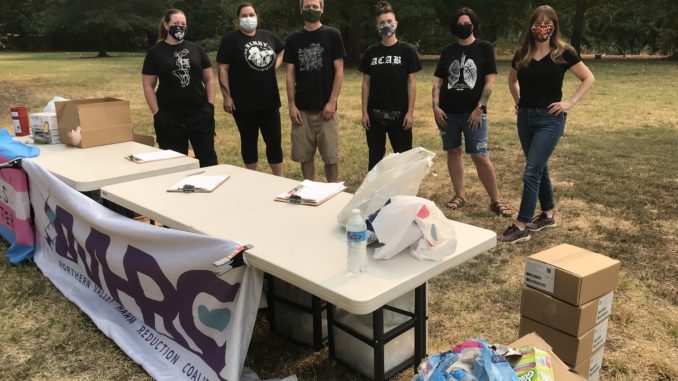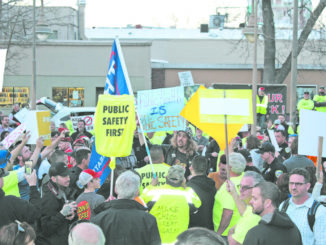
Following a legal settlement that stopped the Northern Valley Harm Reduction Coalition (NVHRC) from distributing sterile syringes in mid-August, volunteers from the organization continue to show up at Humboldt Park each Sunday to provide what they still can—snacks, containers for used sharps, and free HIV and Hepatitis C testing, to name a few things. But perhaps the most important thing they offer, volunteers say, is love and acceptance.
“A big part of our work in harm reduction here is to reduce the stigma around people who use drugs,” Nicole Kessler, a social worker and NVHRC volunteer, said one recent Sunday (Aug. 30). “The message we try to send them is you are worthwhile, you’re part of our community, that we are here for you and we care about you no matter where you are in your [addiction] cycle. People are infinitely more likely to make positive changes when they feel valuable and worthwhile.”
Emily Lane doesn’t just agree with Kessler, she says she’s living proof that this philosophy works. Lane first began visiting the NVHRC booth last year as a user. Now clean from opiates, she’s stepped to the other side of the table and volunteers every Sunday.
“When I was using—and I used for a long time—I was always homeless and always struggling,” Lane said. “Even when I started to get clean, I would think, ‘If everyone is going to think all I am is a piece of shit; if I’m never going to be able to get stable housing; if I’m always going to struggle, then why am I not just shooting up? At least I have that if I’m never going to have anything else.’
“Changing that dialogue and having someone tell you you’re important and have value, that really carries,” she continued. “It encourages people to get help and keeps them from falling back to that ‘Fuck it, I’m gonna die early because I have nothing to live for’ mindset.”
Data from the Centers for Disease Control and Prevention vouches for the efficacy of clean syringe distribution in reducing the spread of blood-born infections like HIV and Hepatitis C, and NVHRC volunteers say that the inability to continue doing so has drastically reduced the number of people visiting the park. As a result, their efforts to deliver outreach, help in recovery and reduce the transmission of deadly diseases has been negatively impacted.
Outreach is crucial
While NVHRC volunteers are not currently distributing clean syringes, the program is still accepting used ones for disposal. Since the ban, offerings have been limited to information about and referrals to social service and addiction resources, Narcan nasal spray dispensers to help prevent lethal overdoses and living essentials like hand sanitizer, hygiene items and bottled water.
According to several NVHRC volunteers, one of the program’s main strengths is connecting with those suffering from addiction on their own terms.
“We get to talk to a lot of people who are hard to reach,” Kessler said. “These are the folks who aren’t accessing traditional services at offices or through behavioral health, but they come here and talk to us, and that alone is huge. They start to develop relationships with professionals in ways they haven’t in the past, and through those relationships we’re the able to figure out what their needs are, assess their motivation for change and encourage change in a way that is positive and healthy.”
Kessler said she has been volunteering with NVHRC since January and that not a week goes by that she hasn’t witnessed at least one person start the process of obtaining medication-assisted treatment (MAT). She recalled one exceptional week when 15 people agreed to start such treatment. MAT, which uses drugs such as suboxone and methadone combined with counseling and behavioral therapies, is widely accepted as the most effective treatment for Opioid Use Disorder.
Marin Hambley, who oversees the testing portion of NVHRC’s services, said those efforts have also had an indelible positive impact.
“When we test folks and [their results] come back negative, we’re able to educate people in the field about how things are spread and what they need to do to stay safe,” Hambley said. “We’ve had positive results, too, and in those cases I’ve accompanied people all the way, from handling their results to follow-up treatment.
“So many drug users have been shamed out of every medical facility in this county, and they have so much fear going in,” Hambley continued. “We help them figure out insurance and other issues, help them apply for Medi-Cal if needed, and enable them to use our program’s authority to ensure they receive treatment. Because of these services and our support, they can say, ‘I’m positive, I have proof, and I know my body has value.’”
Angel Gomez, NVHRC program director, estimates that before syringe distribution was halted, the program would provide access to services to roughly 50 to 70 people in the park per week; those numbers have dwindled to a few dozen people every Sunday.
“We’re definitely not seeing the volume of people that we’re used to seeing when we had syringe access,” she said.
Gomez also noted that the program’s decreased outreach can have particularly dangerous consequences during the COVID crisis, which has caused increases in the rates of relapse and overdose. Information collected by the University of Baltimore’s Overdose Detection Mapping Application Program (ODMAP) shows that suspected overdoses increased by more than 17 percent nationwide from mid-March to May.
Still fighting
NVHRC’s weekly presence has been a point of contention among Chico residents who have been opposed to syringe distribution since it began setting up tables and tents in Humboldt Park last November, with critics alleging it worsens crime and drug abuse while contending that discarded syringes pose threats to public safety and the local environment.
For months, the Sunday gatherings would draw dozens of protesters, some of whom verbally harassed—and on more than one occasion, claim some of NVHRC’s regulars, physically assaulted—clients and volunteers. In response, NVHRC supporters also showed up at the park to help shield participants.
In August, NVHRC stopped its syringe distribution due to a lawsuit filed by Rob Berry, a local attorney and outspoken public safety advocate, on behalf of 20 plaintiffs including the Downtown Chico Business Association and environmental consulting firm Gallaway Enterprises. In addition to other claims, the plaintiffs alleged the program violated the California Environmental Quality Act (CEQA).
NVHRC announced its intention to settle via an Aug. 18 press release, which read in part, “While the plaintiffs’ interpretation of this law [CEQA] is out of sync with the law’s intent, members of NVHRC have decided to not squander energy and state resources in the courtroom, and instead take the necessary steps to prioritize the safety of community members in an increasingly hostile situation, and to focus their energy on protecting harm reduction services in Butte County over the long term.”
The group has continued to show up—sans syringes—every Sunday, much to the ire of Berry and other needle naysayers. When they first did so on Aug. 23, Berry posted photographs from the park and a tirade against NVHRC to the Facebook group Chico First.
“It is as if these people are at war with any sense of community standards or acceptable conduct,” Berry wrote. “This is being driven by the national Harm Reduction Coalition lobbying and community organizing group. They specialize in how to stick it (pun intended) to the communities that don’t want drug use normalization in their communities.”
“I’m not surprised [that opposition continues],” Gomez said. “We knew this was never about syringe access, and that’s became abundantly clear. Even though we’re not offering syringes, they’re still upset about our presence and offering all the other services.”
At the Sept. 1 Chico City Council meeting, Berry continued to pursue the syringe cause, threatening the city of Chico with legal action if the council doesn’t meet a litany of demands, including strengthening local laws to prohibit the distribution and possession of syringes.
Councilman Sean Morgan, another vocal critic of NVHRC, moved to agendize discussion on a syringe distribution ban. The council approved the motion 6 to 0 (councilwoman Kasey Reynolds was absent), and will discuss such a ban at an upcoming meeting.
Gomez said the group is exploring all options to reinstate its ability to distribute syringes, but the process will take time and consideration in order to protect against further legal challenges.
“HIV, hepatitis C and drug addiction aren’t going to go away just [by denying] access to clean syringes,” she said.

